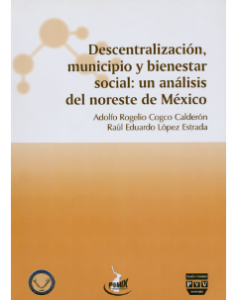Decentralization, municipality and social welfare: an analysis from the northeast of Mexico
Synopsis
The book presented is a remarkable contribution within the literature on public policies and social policy in Mexico. The work is based on a great reflective effort on the heterogeneous administrative framework in which municipalities can implement social welfare actions in their territories, all written in a clear and simple manner.
The work represents a great challenge because it performs an analysis on different aspects simultaneously. It begins with historical information on the decentralization process that took place at the end of the 1980s as a result of the State Reform in Mexico. The authors emphasize that decentralization is a process that has not yet been concluded, so that in Mexico one can only speak of a "partial decentralization" derived mainly from the transfer of functions and attributions from one governing body to another. It is identified that decentralization has generated autonomy for local governments only in the administrative part and not in the financial part, since in this area it has been the central government that maintains a strong control over resources, which limits significantly the institutional capacities of the municipalities.
The particular prism of the work is the capacity and scope of the actions of local governments in the design, implementation and execution of social policy in a local context that allows for better development and social welfare. For this reason, four municipalities in the northeastern part of Mexico are analyzed in depth: San Nicolás de los Garza and General Escobedo, in Nuevo León; and Tampico and Ciudad Madero, in Tamaulipas, with which it carries out an analysis that links decentralization and its impact on social development, under the vision that this relationship is important, since it links the theoretical sustenance with the development of Mexico generated to through the modification of roles in the application of public policies of an economic and social nature in local spaces.



